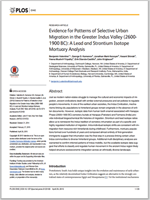When Mothers Need Others: The impact of hominin life history evolution on cooperative breeding.
Abstract The evolution of cooperative breeding is particularly complex in humans because many other traits that directly affect parental care (shorter birth intervals, increased offspring survivorship, juvenile dependence, and older ages at dispersal) also emerge during the Pleistocene. If human cooperative breeding is ancient, it likely evolved in a hominin lacking a fully modern life…


